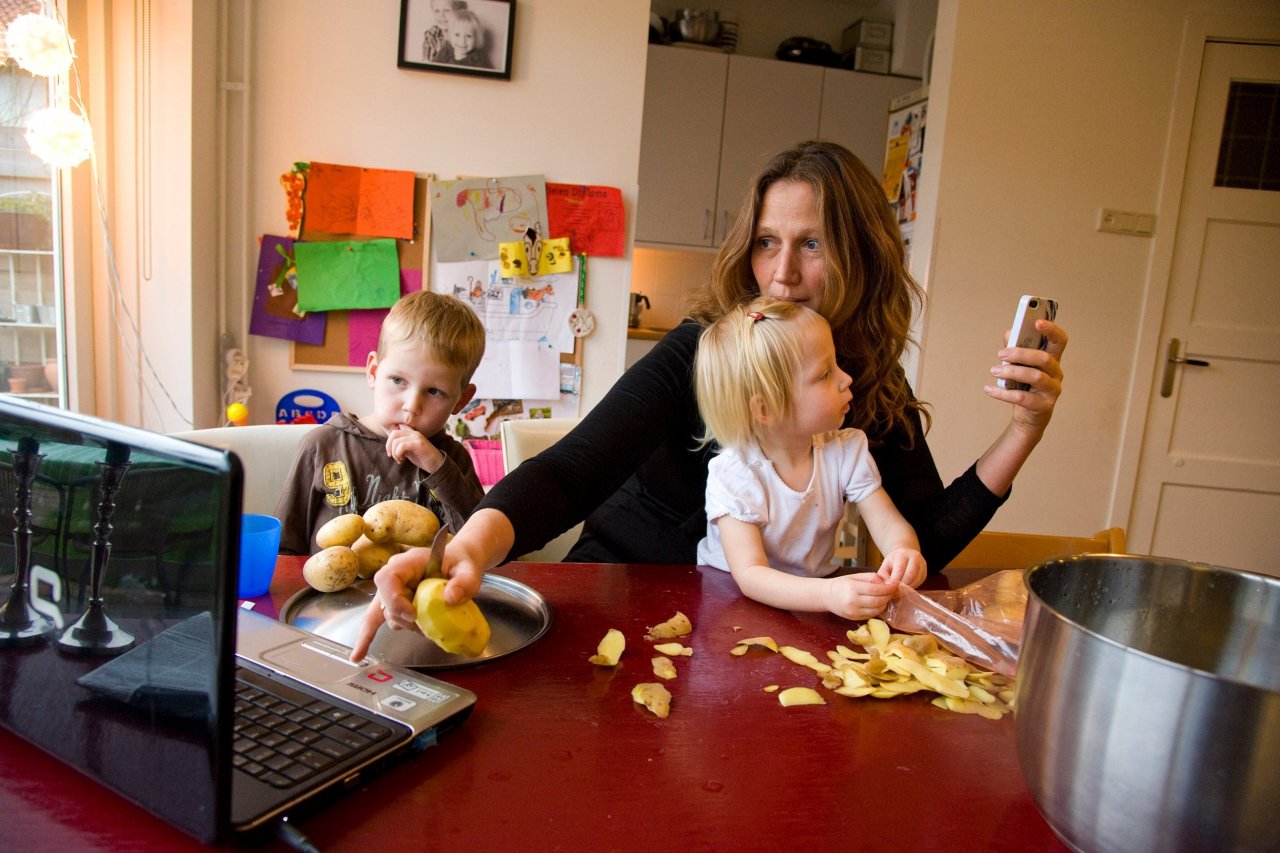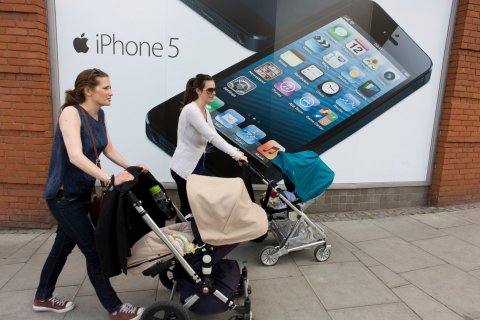
Kimberly Gervaise, a stay-at-home mother of three in Little Silver, N.J., joined Facebook five years ago and only posts every couple of months, mostly sharing photos from special events, like birthdays. She has 393 friends, and wishes some of them would tuck it in a bit. "I get a little annoyed about people who feel the need to post a picture of a straight-A report card – and there are many," she says. "I am sure that most of the time, they are just proud, but I find it annoying."
Gervaise says more and more mothers are using Facebook as a platform to boast about their lives, their kids, their parenting techniques. And that's making it harder and harder for moms like her to log on without getting slapped in the face.
When Tiger Moms Attack
Bragging about your kids is nothing new, but before Facebook, the Compare & Contrast game was mostly played at the playground or the preschool parking lot. Moms would stand around discreetly scrutinizing kids to see who was hitting milestones faster or slower than their own children.
Now it's going on all day, every day, in a vast electronic sandbox. Facebook moms are constantly bombarded with updates about their friends' kids and their accomplishments. Daily, hourly even. According to Edison Research's Moms and Media 2013 report, 57% of moms on Facebook are over 35 – these women are the first generation to have raised their children entirely in the Facebook era. They started out single, gossiping and posting party photos and flirting, and now they're changing diapers, worrying about peanut allergies and diligently navigating the sometimes treacherous mommy waters. And if they're active on Facebook, they're learning in front of a huge, rapt audience.
Mothers are heavy Facebook users. Edison's 2013 research reveals that 7 out of 10 moms have a profile, and there are more than 1,000 mommy groups, public and private. These groups range in size from hundreds of members to tens of thousands, and they are discussing everything from potty training to gaming that private-school admissions test.
Of all the demographic niches on Facebook, moms check in the most (an average of 5.1 times a day, according to Edison), and they keep coming back, even if they are being battered with subtle – and sometimes not so subtle – "My kid's smarter/healthier/happier than yours" jibes. For the mom who barely gets her kids' shoes on before hustling them off to school, posts that portray the perfect family can churn up guilt or even self-loathing. "Who has time to get the paint and glitter out? Who has time to clean up the giant mess?" says Meredith DePersia, a working mother of two in San Francisco. "When I see these posts, I definitely feel like a slacker."
The great time-killer is now a massive ego-killer, and even a mommy-blogger with a huge following feels vulnerable. "Facebook makes me feel bad," says Glennon Doyle Melton, who had a New York Times best-seller with Carry On, Warrior. "No matter how satisfied I am with my life, career, family, social life, house, etc., as soon as I log on to Facebook and peek into others' lives, I immediately feel that unease caused by comparison. … A little kernel of doubt settles into my gut, and it feels really bad."
This onslaught is turning many women off. "One thing that drove me crazy when my son was younger was moms posting about how well their baby slept," a mom from Texas recalls. "Our son was a pretty poor sleeper, and we spent so much of that first year utterly exhausted. So to be honest, when I would see a post gloating, 'X slept for six hours straight last night!' I would immediately hide that person for a while because it would irritate me."
An online media professional and mom of one from Falls Church, Va., is so tired of playing the game that she's taken her ball and gone home. "I kind of avoid Facebook entirely," she says, "because I'm sick of everyone's presentation of perfection."

The Fine Line Between Posting and Boasting
There is nothing in the Facebook rules that requires complete honesty and total disclosure, and it is human nature to portray the best version of one's life. From carefully curating our vacation snaps to sharing perfectly posed first-day-of-school photos, all of us, not just moms, try to portray a problem-free, fun-filled, blissful existence. And that can be pretty annoying if you've just spent the morning watching your 4-year-old repaint your kitchen walls with oatmeal.
"An acquaintance posted a drawing her daughter had made, and it was so perfect. Way more than my son could do, even though he is the same age," says a teacher and mother from Texas. "I panicked for a minute, but talked myself down. If someone is posting positive, cheerful, perfect crap all the time, I always think: Nope. Not buying it. No one's life is that perfect."
Part of the problem is that this isn't happening in real time, face to face. That means moms who might not mean to offend are missing the social cues that normally put a damper on excessive crowing. "Social networks like Facebook haven't changed the way people respond to bragging; they've changed how much people brag," says Dr. Pamela Rutledge, director of the Media Psychology Research Center. "The ability to publicize so much has blurred the line between sharing and boasting.
"When you brag in a group, you notice when they wander away. When you brag on Facebook, it's harder to tell who you're alienating."
The Breast-Feeding Mafia
If moms are annoyed by seemingly benign photos and status updates, what happens when posts or comments are aggressively pushing an agenda? Whether discussing the merits of breast-feeding, home-schooling, sleep training or vaccinations, an increasingly strident group of moms are using social media as a place to push their beliefs – and due to its design, Facebook allows moms to monitor their newsfeed, waiting for the right moment to swoop in, talons bared.
"A friend recently posted a question on baby sleep (she was seeking advice about letting baby cry versus going in)," a mom from northern Virginia says. "I posted what worked for us, and another mom commented right after me and said that allowing a baby to cry will give them brain damage. Yikes."
Jen Johnston, who's raising two children in northern Virginia, got burned in a similar exchange: "I recently saw a debate on vaccines versus no vaccines, where the moms were being totally judge-y and mean. In the process of this 'debate,' one mom commented on a photo of a baby with measles and said he looked like a giraffe. Really? We now make fun of babies with diseases?"
It's unlikely a mom will shame a good friend in public for having different values or beliefs, but when the person is just an acquaintance, the rules change. "When I was pregnant with my son and posted something about going back to work, someone commented that it was a shame he had to go to day care and that I should really try and quit my job so I could stay at home," recalls Carolyn McCoy, a paralegal and mother of two from Burke, Va. "The comment bothered me, and I felt guilty. For a quick second, I even wondered if I should try to stay at home. Frankly, I didn't know her well enough for her to be giving me that kind of advice!"
Really? We now make fun of babies with diseases?
UrbanBaby, a website that takes mommy competitiveness and public shaming to the limit of civility (and often beyond), is totally anonymous. Facebook, with its friends and perceived intimacy, almost seems too polite a forum for harsh criticisms and judgmental quips. But alas, it's not.
Moms are notorious for bragging about their kids and sharing their opinions on child-rearing, but it's so much worse on Facebook because there's no filter, no rules, no precedent. Moms with strong views on vaccines and breast-feeding didn't previously have a platform from which to preach that offered a built-in captive audience. "One girl who clearly has a strong opinion on vaccines and DOES NOT vaccinate her kids posts articles and opinions all the time, which inevitably leads to mommy debates and strong opinions," says the mom from Little Silver, N.J.
A mom of two from a San Francisco suburb confesses that she's sometimes guilty of preaching. "I see lots of opinionated posts that pretty much state, 'I know everything because I have kids!' And I know that's what they mean, because that's what I mean when I'm giving my opinion. I am one of those people!"

Is There Life After Facebook?
Dr. Goal Auzeen Saedi, author of the blog Millennial Media, thinks it's important to keep it all in perspective. "Remember that, like TV, not everything you see on Facebook is true. No one's life is perfect. And the more that people try to prove how great it is, the more it's often a sign that it's not. It's important for moms on Facebook to take a step back, get some distance and reassess."
Many feeling-smothered mothers don't want to "step back"; they want to escape, to bust free. "I deleted my Facebook account!" crows a stay-at-home mom of two in Austin, Texas. "I hated the 'Keeping up with the Joneses' behavior that Facebook engenders."
Not everyone is ready – or able – to completely cut the FB umbilical cord. One mom decided she just needed to take control of her page, and muzzle the braggarts and know-everythings. "I cleaned house a year ago and only connect with people I'm actually friends or family with," she says. "I found that I'd catch up on Facebook and be cranky after, so I changed my profile to only let Facebook be what I want it to be."
More and more moms are taking a self-prescribed break. "When my son was about six months old, I took a six-month hiatus from Facebook," says Cristina Miller, a mom of one from Palm Springs, Fla. "A cleansing of sorts. My husband tells me he saw a huge difference in me when I took the break. He wishes I'd do it again."
Even mommy-blogger Melton took a Facebook vacation. For 40 days, the 101,000 followers of her Momastery website waited patiently as she took a breather. It was during this break that she realized how unhappy Facebook made her at times. "I called my sister the other day and said: 'I'm going to quit Facebook. I don't use it right. Whether I want to or not, I just end up comparing myself to everyone else.' "
"And [my] sister said, 'Actually, you're using it for the exact thing it was originally designed for. Remember, some college guys made it so that students could compare women to each other and decide who was hotter.' "
Melton ponders this for a moment. "And I thought, Ah. Right. Huh. The origin of Facebook is really annoying and offensive, when you think about it.
"And even more annoying is that we often still use it for what it was originally intended: comparison."





